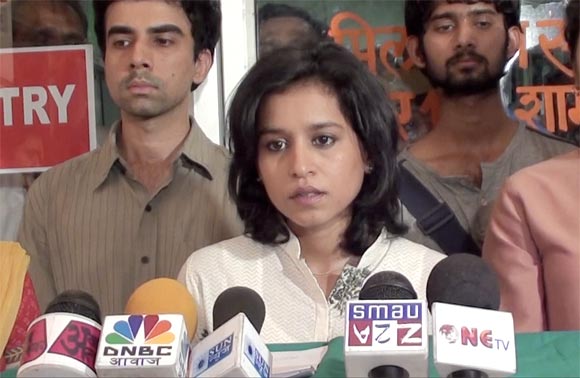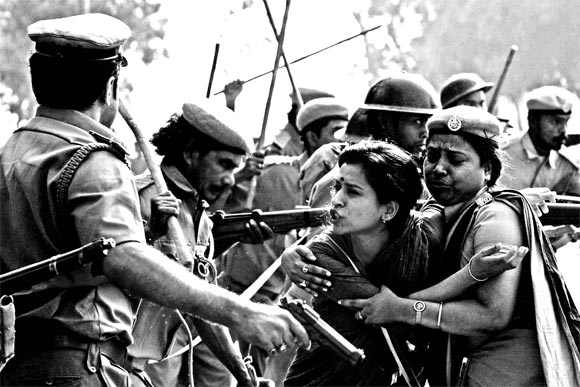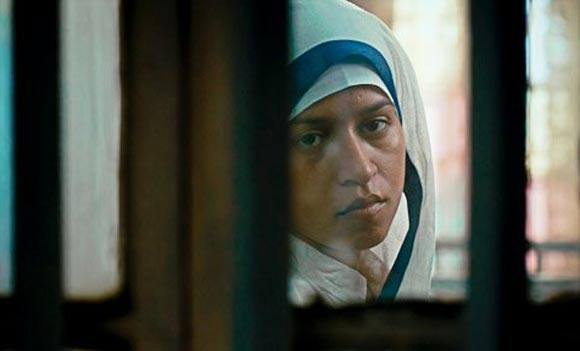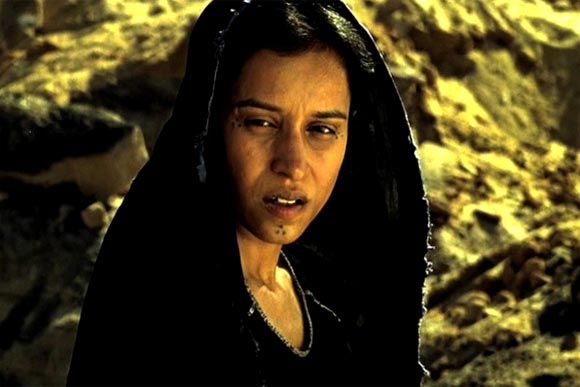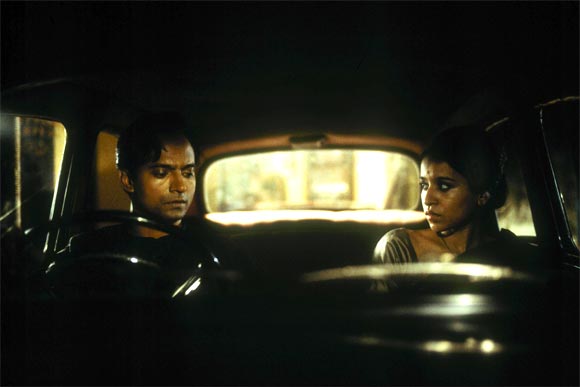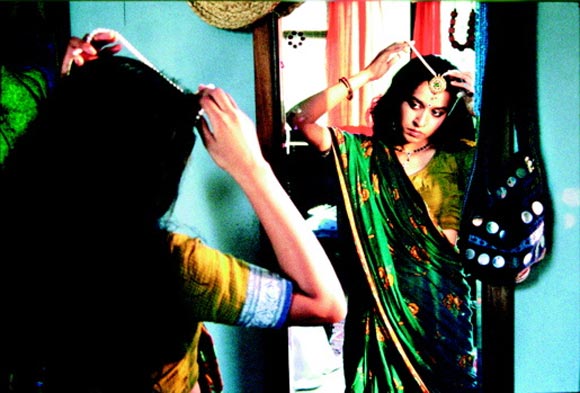 | « Back to article | Print this article |
'The story of Shanghai is haunting'
Last updated on: June 11, 2012 19:19 IST
Dibakar Banerjee's films have strong performances by a host of supporting actors.
In his new film Shanghai, inspired by a Greek novel Z, and also an Academy Award winning French film of the same name, Tillotama Shome plays a relatively small, but significant role as Aruna Ahmedi, the wife of charismatic activist leader (Prosenjit Chatterjee).
It is a quiet, heartbreaking performance by Shome, who until now was best known for her performance as Alice, the maid in Mira Nair's Monsoon Wedding, who won the heart of P K Dubey, played memorably by Vijay Raaz.
Banerjee describes Aruna Ahmedi as his favourite character in the film: "It flies in the face of all the stereotypical wife roles that we are used to."
In the film, we are introduced to Aruna at a point when her husband is seriously injured and in hospital being cared for by his immediate circle of followers that includes Shalini (Kalki Koechlin), with whom he had an affair.
As Banerjee describes it, there is a "stand-off (between the two women)... as if they challenge each other as rivals to be the real inheritors to Ahmedi's memory."
Aseem Chhabra spoke to Tillotama over the telephone from New York, while she was attending a wedding in Pune.
'I had seen Z long ago when I was a college student at Delhi University'
Last updated on: June 11, 2012 19:19 IST
How did you get the role in Shanghai?
Through casting director Atul Mongia. If there is an award for a casting director, I think he should win it.
The kind of films Dibakar makes, he likes to have a large ensemble cast and Atul is a rare casting director who takes his time and seeks faces that have no hype around them.
Atul asked me to come for the audition and after that I tried to forget about it.
Then I ran into Dibakar at a jazz festival. He said, 'I know you have auditioned, but we are looking at other actresses also. Now let's see who wins the round.'
Where was the film shot?
We shot it in Latur (in Maharashtra).
I am curious, had you seen Costa-Gavras's Z before working on Shanghai?
I had seen Z long ago when I was a college student at Delhi University. I remember the actress Mrs Ahmedi is modelled on.
...The legendary Greek actress Irene Papas.
Yes, Irene Papas. I remember her performance. Of course, her role was much longer in Z and the context was very different.
'While my scenes are very few, they are so well written'
Last updated on: June 11, 2012 19:19 IST
What directions did Dibakar give you? It's a very composed sort of role you are playing, dealing with your internal tragedy.
Dibakar was very clear about each character. He had already told the costume designer that I should look like Vinita Kamte, wife of the slain cop from the Mumbai terror attack.
If you remember, she went on television asking for justice for her husband. I had to cut off my hair and wear similar clothes.
Though my situation was different, Dibakar asked me to observe how she spoke to the media about her loss, the tragedy that she is going through. She wanted to get to the bottom of why this happened.
So Dibakar gave me Vinita as an entry point to understanding Mrs Ahmedi - that she had a public face, despite her huge personal loss.
The second thing that Dibakar told me was that if he had the luxury, he would make a film of Aruna Ahmedi, her husband and Shalini. He called it a tale of "love, loss, infidelity ideals, politics."
But in the film it is like a secret chamber. And we made a back story of the character to get a sense of what the marriage might have been like. She might have shared his dreams, but then despite living with this demi-god, her politics had changed.
At some point their paths must have diverged, politically and ideologically. The fact that he was surrounded by young women who were besotted by him and his ideology, how that must have impacted the marriage
Dibakar told me that this was one of his favourite characters in the film and that he wanted to bring out the complexities of the marriage and the partnership.
While my scenes are very few, they are so well written. And for me the subtext became greater than the text.
'Dibakar tells the actors to follow the path he has laid out for them'
Last updated on: June 11, 2012 19:19 IST
How many days was your shoot?
I had eight days of the shoot.
What kind of atmosphere does Dibakar create on the set? How does he work with the actors on the set?
My first scene was when Aruna breaks down in the bathroom after she has been given her husband's wallet.
I was planning the scene in my mind. But Dibakar gave me specific details of walking into the bathroom, putting the tap on, looking at the wallet and then breaking down.
I was somewhat taken aback because other directors let the actors improvise the scene and then they keep what works for them and discard what doesn't work.
But Dibakar is a great story teller. So he sat me down and in hushed tones he once again told me the back story of the marriage, the politics, the sexual tensions that could be there.
I was so enthralled by the way he took me to that space, that when I walked into the bathroom I did exactly what he had asked me to do. But it felt organic.
It is a completely different way of working where he knows what he wants and he tells the actors to follow the path he has laid out for them. But the actors start to feel "Oh I designed this path myself."
What are your memories working with Kalki and the other actors?
Most of my scenes were with Kalki, but after the shoot I did hang out with the other actors -- Abhay Deol, Emraan Hashmi, Pitobash and the others.
The coolest thing about working with these actors was that they are extremely talented people and they are very secure with where they are. They are also down to earth; there are no star hang ups.
'Post Monsoon Wedding, Shanghai is my first big commercial release'
Last updated on: June 11, 2012 19:19 IST
You give such a powerful, controlled performance. What was your reaction when you saw the film?
This is the first film I have worked in as an actor where I was unaware that I was a part of it.
In Shanghai, I felt the story was so powerful, I found it haunting. And I didn't even realise that I was in the film. I was so mesmerised by the story telling.
After Monsoon Wedding, you spent a few years in New York and then you moved to Mumbai. What has that move been like?
I think it was a super move.
It takes some time to find your way in Mumbai. I accepted the city with an open mind, rather than coming from a political, intellectual space.
I think the smart thing I did, with good friends around me, was not to get into the cynicism.
I have had a good flow of work. It's just that post-Monsoon Wedding, Shanghai is my first big commercial release.
I saw you in the Italian production Gangor and also in the Australian film The Waiting City. And then you did quite a few short films. Monsoon Wedding was released 11 years ago. As an actor how does it feel, because I know you took time off and you were taking courses in New York and also you taught for some time.
Part of it is because I have constantly shifted the focus of my interest. The change of space from Delhi to New York and now back in Mumbai takes its own shape.
In Delhi I was cut off from Bollywood. In New York, I was a student at New York University and was learning all over again. My life was quite comfortable in New York academically.
So then coming back to Mumbai could have been almost suicidal. But this is good since I am getting the kind of work that I've always imagined I wanted when I decided to become an actor. I know that I got this role in Shanghai because of my training in New York.
'I will be playing the lead role opposite Irrfan in a film called Qissa'
Last updated on: June 11, 2012 19:19 IST
Before Monsoon Wedding, did you go to drama school?
No, I didn't go to any acting school. Monsoon Wedding happened right after I graduated from Lady Shri Ram College in Delhi where I studied English Literature.
I accidentally started acting. But after Monsoon Wedding, I thought that the people I admire had studied acting, even though not necessarily formalised. So I decided to study to become a better actor.
Do people still remember you as Alice from Monsoon Wedding? That is how I first recognised you when we met in New York.
It is a cross that I carried for a while. It's been an extremely important aspect of my life.
Because Monsoon Wedding did commercially well as compared to some of my other work, it becomes a constant reference point.
What is remarkable is that in the interviews I have been giving for Shanghai, very few reporters seem to connect me with Alice.
I was recently interviewed for a story on new, interesting faces where I will be featured with truly new actors and I am thrilled. Shanghai has helped me to finally break out of the Alice mould.
Where else will we see now after Shanghai?
Of my next two films, one is a trippy film Tasher Desh by Q (director of Gandu) which is based on Rabindranath Tagore's musical.
After that I will be playing the lead role opposite Irrfan Khan in a film called Qissa. It's an international co-production in Punjabi and I spent seven months learning the language.
So this past couple of weeks must have been remarkably different?
I was 22 when Monsoon Wedding opened. I was quite unaware of what was happening. A decade later it is quite lovely getting all of this attention.
